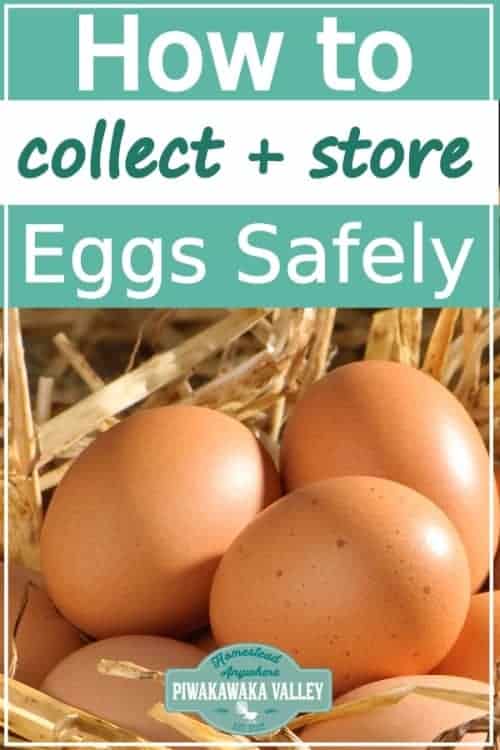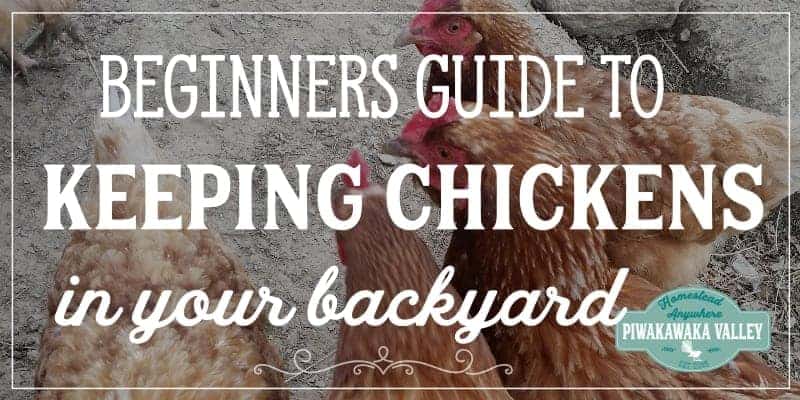This post was most recently updated on March 10th, 2021
If you have chosen to rear chickens for their fresh eggs, here is everything you need to know about safe collection, handling and storage of your eggs to keep them fresh and safe to eat.
Please read: This information is provided for educational purposes only and is not intended to treat, diagnose or prevent any disease. We encourage you to make your own health care decisions in partnership with a qualified health care professional.
This post contains affiliate links, this means at no extra cost to you, we make a commission from sales. Please read our Disclosure Statement
Chickens are birds, many birds are carriers of known illnesses, with salmonella being the most common. If you have ever managed to contract salmonella you will know about it! It is a horrible gastrointestinal bug and a common cause of food poisoning. Keeping your chicken eggs clean will prevent you catching this horrible disease!
Collecting your Fresh Chicken Eggs – How often should you collect chicken eggs?
After your hens lay their eggs, it is important for you to collect them as soon as possible. This is to keep them from being eaten by chickens or from being soiled through extended contact with chicken poop, regular chicken dirt or the remnants of any other broken eggs.
It is recommended that you check for eggs frequently through the day.
Another important reason why you need to collect eggs as soon as possible is to prevent extended exposure to extreme weather or temperatures during summer and winter.
If eggs are left out for too long in the summer heat, they lose their fresh quality much faster. On the other hand, if you leave them out for too long during freezing winter temperatures, the eggs are bound to crack or freeze.
RELATED: 15 ways to save money feeding chickens
The best times to collect fresh chicken eggs
You can look for eggs twice a day, once in the evening, and once in the morning. This helps keep the nests clear and also saves the eggs from predators such as rats, raccoons and snakes.
Making fresh egg collection easier
To make the task of collecting eggs easier, it is recommended that you provide a nesting box for every 4 hens.
The nesting boxes should be lined with a thick layer of bedding, such as hay or wood shavings, to provide a soft place for the hens to lay their eggs.
Make sure you clean out any poop, dirt or broken egg remnants to prevent the soiling of future eggs as soon as you notice it.
If you make your nesting boxes inviting, cosy and dark, your chickens will lay their eggs in the nesting boxes; saving you the time and work of walking around hunting for eggs all the chicken coop and yard.
Preventing your hens from eating their eggs
Remember to remove cracked eggs from the nesting boxes as soon as possible to keep the hens from eating them.
If the hens eat broken eggs, they can discover how tasty they are and then develop a taste for them, putting any future eggs in danger of being eaten by the hens.
Any hens that have already developed this behavior should be separated from the others as it is quickly learned by others.
RELATED: Stop your chickens eating the eggs
Preventing egg breakages
Place your eggs in a smooth container that is rust free, we like to use a cane basket.
When collecting the eggs, avoid stacking them more than five layers high as this increases the pressure on the lower layers of eggs, increasing the likelihood of unnecessary breakages.
Once you have collected all your eggs, you will need to handle them with care to ensure that you don’t end up cracking or contaminating them.
Handling And Cleaning Fresh Chicken Eggs
All the collected eggs should be inspected, and those found to have cracked shells disposed of, you can cook them for your dogs, or even to feed back to the chickens, but if the shell is broken, it is too risky for humans to eat in case they have picked up bacteria.
Some of the eggs you collect will inevitably have poop and dirt stains. Before you even think about cleaning the newly collected eggs, it’s important to note that all eggs have a natural protective layer called a bloom that keeps out dirt and bacteria no matter how dirty they may appear to be.
Once you clean your fresh eggs with a wet cloth, you risk breaking down this protective layer, leaving bacteria to seep through the porous shell into the egg.
Because of this, it is best to leave the eggs as they are, and only wash them when you are about to cook them, or store them in the refrigerator.
If the poop is dry, you can flick it off. But otherwise just leave it until you are about to use the egg.
However, if you feel that you must clean your fresh eggs before storage, especially when they are heavily soiled, it is important that you follow the right procedure.
Use a damp cloth or paper towel to brush off any dirt, poop or any other substance clinging onto the shell. For those stains or particles that won’t come off so easily, consider using a sanitized rough sponge to remove them.
Leave the cleaned egg on a tea towel for a few minutes to dry then it is ready to use.
RELATED: how to check if your hen is still laying
Safe Storage of Fresh Chicken Eggs
It is best to consume your eggs while they are still fresh. However, if you are collecting more than you can consume you will have to come up with a storage system.
The basic rule of thumb is to ensure that you consume the oldest eggs first. This way you will minimize the chances of having bad eggs in storage.
This is when an egg storage caddy like this comes in handy, you put the fresh eggs in the top and take the older eggs from the bottom.
How long can freshly laid eggs be unrefrigerated?
You don’t have to store your fresh eggs in the refrigerator, especially if you don’t intend to store them for long. However, refrigeration helps you keep the eggs fresher for longer and if they have been in the fridge, you need to keep them in the fridge.
Eggs left at room temperature lose in 24 hours, the same level of quality that a refrigerated egg loses in a week!
Make sure that you come up with a way to keep track of how long you have had each set of eggs in storage. Fresh eggs, stored at room temperature should be consumed within five weeks.
Eggs in a refrigerator will last for months if their bloom layer is left intact! If you are not sure how fresh your eggs are, be sure to check them before consuming them!
Checking to see if an Egg is Fresh:
There are multiple ways to check if an egg is fresh enough to eat.
If you are not sure whether an egg has gone bad during the storage period, simply place the egg in a deep glass of water; if it floats, it should be thrown in the trash.
- Fill a cup, bowl or tub with enough cool water to cover the egg plus 2 inches
- Carefully place the egg in the water
- If the egg stays at the bottom of the container it is fresh (less than 10 days old).
- If one end lifts a bit up but part of the egg is still touching the bottom of the glass then it is around 10-21 days old. These are perfectly edible but I prefer to use them for cooking or hard boiling.
- If the egg floats it is no longer good to eat and is probably rotten, be careful with it!
Old eggs also become more dull to look at (the bloom is degrading) and the shells take on an almost translucent slightly grey colour.
I always give eggs a sniff once I have broken them in to a bowl before using them, you can tell by the smell if they are fresh or not. Once you have smelt a really rotten egg, you will never forget it! *gag*
Fresh egg yolks are rounded and the whites hold together, the older the egg, the more flat the yolk and the more spread out and split the whites will be.
Older eggs (not rotten ones!) are still great for baking with, in fact if you want whipped whites for a recipe, eggs that are at least a week old hold their shape better when they are beaten.
With the above information in mind, collecting handling and storing your chickens freshly laid eggs should be a walk in the park.







